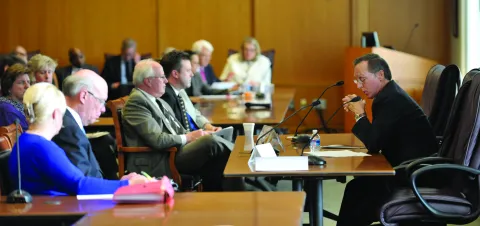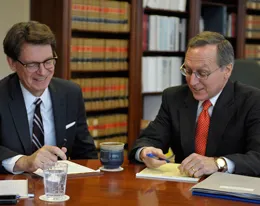
Director's Message
Judge John D. Bates. It was a great privilege to be only the second judge to serve as Director in the 75-year history of the Administrative Office of the U.S. Courts (AO). As of January 2015, I relinquished my duties as Director to take on additional judicial duties at my court, the District Court for the District of Columbia. I return better informed about judicial administration and with a renewed appreciation for the excellence that exists in both the AO and the courts.
I am grateful to the Chief Justice for placing his confidence in me, and I greatly appreciate the tremendous support I received from judges, and from court and AO staff.
It may seem trite to say that I am proud of our success in keeping courthouse doors open and cases moving. However, it took great coordination and planning to begin the recovery from the severe funding reductions we endured during sequestration. In many ways, this rebuilding process was our greatest accomplishment in 2014.
We were exceedingly fortunate that, when a funding bill finally was enacted, Congressional appropriators treated the Third Branch as a priority in both Fiscal Years 2014 and 2015. I believe that our cost containment efforts continue to demonstrate that we are serious about using taxpayer money prudently. We also have in place numerous broad accountability controls, ranging from audits and program reviews to required stewardship training for senior AO and court managers. Our strong commitment to the highest fiscal and ethical standards helps assure that the limited resources available are carefully managed and properly spent.
Much of our cost-saving focus has been on court space. We have scoured our rent bills; courts have developed space management and reduction plans; and our integrated workplace initiative will enable courts to use space in a flexible and efficient manner. We also are reexamining staffing formulas, using less costly and easier ways to reach prospective jurors, and replacing our aging legacy accounting system with a new, centralized financial management system.
As Director, I’ve had the opportunity to participate in conferences, advisory councils, workshops and other meetings involving judges and court staff from across the country. While I delivered news from Washington and the Administrative Office, I also absorbed a tremendous amount by listening and observing our courts in action. I learned that we are uniquely skilled problem solvers on both a local and national level.
As one example, the District of Nevada developed an automated system for processing and managing vouchers submitted by lawyers appointed to represent indigents under the Criminal Justice Act. Through a collaborative effort, the system, known as eVoucher, is being adopted for national use and shared with courts throughout the country.
On a broader scale, the national roll out of the Next Generation of our Case Management/Electronic Case Files System has begun in the courts of appeals. It will increase chambers’ and clerks’ office efficiency and, when fully implemented, will provide for a single sign-on for public users. Testing in district and bankruptcy courts will begin in 2015.
The strength of the federal Judiciary lies in our ability to work together to confront the challenges that come our way. While I will remain a committed member of that team, it was a unique honor to serve in a leadership position as Director. The AO plays a central role in helping courts function smoothly. I benefitted greatly from Judge Tom Hogan’s fine work before me. I am also proud of what we have accomplished and know that Director Jim Duff, with his accomplished leadership skills, will continue the tradition of excellent public service.
Judge John D. Bates
Director, July 2013 – January 2015

“Judge Bates has done a superb job in supporting the needs of the Judiciary in a challenging budgetary environment. As much as I appreciate his invaluable service, I understand his desire to re-dedicate his considerable energy to judicial service. On behalf of the Judiciary, I thank him for his leadership.
“I am delighted to welcome Jim Duff to succeed Judge Bates. Jim earned the full confidence of the Judiciary during five years of exceptional service between 2006-2011, and we are very fortunate that he has agreed to return.”
Chief Justice John Roberts, Jr., November 4, 2014 press release, Supreme Court of the United States
James C. Duff. I am very grateful to Chief Justice John Roberts and the Judicial Conference for the opportunity to serve as Director of the Administrative Office again. I look forward to renewing old friendships and developing many new ones in the Judiciary. From my first job in Chief Justice Warren Burger’s office 40 years ago, through later years as Counselor to Chief Justice Rehnquist and Director of the Administrative Office under Chief Justice Roberts, my respect for and admiration of our federal judges and courts has only grown. It is an honor to work for you.
We face many challenges to the Judiciary—to its operations, to its administration, to its independence—but I am privileged to work with outstanding colleagues throughout the federal Judiciary to meet those challenges.
Judge Bates and Judge Hogan have served the Judiciary and our country extremely well through several challenges as well, including sequestration. They also led a reorganization of the Administrative Office to increase our efficiencies. We will strive to build on the strong organizational structure they established.
We always welcome your comments and input at the Administrative Office.
James C. Duff
Director, January 2015 –
Director, July 2006 – September 2011
Annual Report 2014
- Annual Report 2014
- Funding/Budget
- The Courts, Congress and the Executive Branch
- The Federal Bench in 2014
- Assuring Accountability
- Facilities and Security
- Innovations
- Initiatives
- Public Outreach
- Defender Services
- Probation and Pretrial Services
- Recent and Proposed Amendments to the Federal Rules
- In Profile: The Administrative Office of the U.S. Courts
